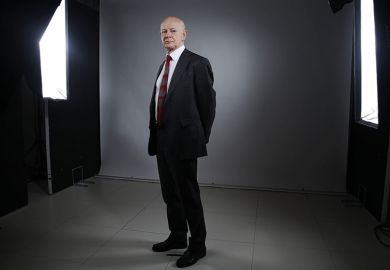Many academics dream that the grass might be greener outside higher education. But for those who are genuinely discontented, what is holding them back? Here, three people tell their stories of taking the plunge.
‘I had narrowed my perceived career paths and distorted my measures of success’
My decision to step outside academia was difficult. As someone who has since moved jobs and worked in multiple sectors, I now value my career mobility, but at the time I knew so little about work outside theoretical mathematics that a new job felt like a foolish move and a form of self-imposed exile. When we are graduate students, as I explain in my contribution to a forthcoming book, A Celebration of the EDGE Program’s Impact on the Mathematics Community and Beyond, we often inherit the value system of our academic advisers. In my own case, I “unjustifiably narrowed my perceived career paths and distorted my own measures of success. The result was that I consistently undervalued my worth and abilities outside of research mathematics early on in my career.”
After graduate school, I returned to teach at my undergraduate institution – a small and friendly school – as a tenure-track assistant professor of mathematics. Unsure what I wanted to do next, I tested the waters over four years, eventually teaching overseas in China and on a Fulbright Fellowship in India before I formally stepped out of academia into a position with the US Department of State’s Foreign Service Institute, the training branch for America’s diplomatic corps. I have since worked for a Silicon Valley algorithms start-up, co-own a robotics software company with my husband and serve as executive director of a professional society, the Association for Women in Mathematics.
So why is leaving academia difficult?
- We don’t understand what careers in business, industry or government (or “BIG jobs”) entail, much less know if we would enjoy the work or succeed
- We don’t believe that our skill set is translatable because we lack the vocabulary to discuss the knowledge, skills and abilities that we possess and that BIG jobs require
- Because of their inherited value system, those who leave academia might believe that they are pursuing another career because they have failed in academia. They are therefore unlikely to bring insight or information about BIG jobs back to their academic community
- In my own field of theoretical mathematics, I am not aware of any structures or pathways to bring someone with a career outside academia to a research and teaching career inside. This one-way street might be interpreted as academia not valuing other work environments and what people from them can bring into the ivory tower. We therefore fear that we might not be welcomed – much less valued – if we later try to return to the academy
- There are many reasons why academic positions are desirable, including control over one’s own time, working on virtuous projects (such as expanding the frontiers of human understanding) and teaching the next generation. Before working outside the sector, I would have assumed that such noble pursuits and job flexibility were unique to academia.
For me, attempting to look out through the “ivory curtain” was daunting. I didn’t know what a BIG job entailed, and because I was unable to articulate my value, I was afraid I would be unable to demonstrate value. I left academia because I wanted to “flourish”: I knew I had more to offer than the talents I was using in my current position and did not find it personally rewarding to work towards publications, grants or the other narrow objectives that defined success in my field. Although I enjoyed my time in academia, I left because the reward system did not align with my interests, an indicator that I would not be happy there in the long term. I have since been able to pursue projects, programmes and causes that have rounded out my life, even if they would not have rounded out an academic CV.
We need to make the boundary between academia and BIG careers permeable. People working in BIG careers could enrich and expand the academic environment for both students and colleagues, just as those with academic training enrich other sectors. Some of this needs to be addressed at the level of administration and university values (which translate into hiring mechanisms and procedures), but there are small things that even departments can do. I would urge all those working in STEM fields to look at the BIG Math Network, a multi-society collaboration (resources and career stories can be found at bigmathnetwork.org). For practical guidance on preparing for careers in mathematical sciences, you can pick up a copy of The BIG Jobs Guide (available on smile.amazon.com).
I currently have the perfect job. As executive director of the Association for Women in Mathematics, I work with others in my discipline – across academia, industry and government – on projects that promote individuals and drive institutional change. I work to strengthen my organisation’s structure, broaden its reach and engage a volunteer army of women and men who are devoted to improving our profession. By stepping out of academia, I have been able to grow and hone the skill set that allows me to strategically manage complex organisations. That means that my next career step could be anywhere within businesses and non-profits, or even back into academic administration.
Karoline Pershell is executive director of the Association for Women in Mathematics and COO and director of research at Service Robotics & Technology, a software company focusing on robotic integration into smart buildings. She was formerly an assistant professor in the department of mathematics at the University of Tennessee at Martin.

Acronyms, bullying and camaraderie: the things I am – and am not – going to miss in academia
As I count down the weeks and days and lectures until I leave academia, having taken voluntary redundancy, Steely Dan’s Things I Miss the Most has been playing regularly on my internal iPod. Unsettlingly so.
Unlike the song’s divorced narrator, I won’t have a comfy Eames chair, good copper pans or a ’54 Strat to grieve over, much less an Audi TT or a second home on the Vineyard, let alone a third on the Gulf Coast – but still. Breakin’ up will be every bit as hard to do as Neil Sedaka suggested.
That said, I know what I won’t miss. I won’t miss the constant shifting of the goalposts. Two-year degrees, online degrees, foundation degrees: anyone for six-week summer crash courses? Has the research excellence framework been a fairer or more accurate metric than the research assessment exercise? Should the teaching excellence framework mean more than the REF – and I can see why it should – or is it unfit for purpose? And don’t get me started on all those blasted acronyms.
Nor will I miss the bullying, something I have witnessed with staggering and soul-destroying frequency. Not the shouty, spur-of-the-moment bullying that pervades newspaper and magazine offices the world over, but something more insidious. And worse, because it emanates from people who like to see themselves as being more attuned to, and respectful of, other people’s feelings and vulnerabilities. In one department where I worked, a psychologist was summoned to heal divisions; staff still found the situation intolerable and took extended leaves of absence.
Being an insufferable pedant, I won’t miss marking, either. What blights the process is less that so few students actually read your comments and corrections, let alone take heed of them (a struggling second-year once confessed to me that he could not take the rejection), than the standard of written English.
Even on journalism courses, which I have helped to run for 25 years, literacy levels are shockingly poor, numbingly so. Indeed, when people ask me what I do for a living, I say I’m a remedial English teacher. Scandinavian students are often superior at choosing appropriate words and crafting sentences than native speakers, which is particularly infuriating for anyone, like me, who errs towards the fascistic on such matters.
I know I’m far from alone in ascribing this seemingly inexorable decline to two things: the reluctance of young people to read anything longer than a tweet (or, at best, a blog) and the way bad habits are allowed to flourish at school. When I secured my first staff job at a university in 2005 and began handling admissions and reading personal statements, I was adamant that an English A-level pass was the one qualification essential to studying and practising journalism, the trade I had immersed myself in for the previous 22 years. I soon learned to my horror that even an A grade was no guarantee of competence.
And yes, it goes without saying that I won’t miss those ludicrous vice-chancellorial salaries, not because they are so much higher than mine, but because they are so much higher than anyone in a struggling sector has any right to be earning, especially in a sector that purports to set an example to the rest of society about equality. And to think that there are primary schoolteachers out there who are willing to take a £7,000 cut to their meagre wage to save the jobs of two teaching assistants. Then again, this is the university business we’re talking about, so perhaps we should give up expecting anything more community-minded.
So, what will this grumpy old man miss? The camaraderie and generosity of colleagues, of course. Being paid to indulge my research interests and to exchange views with other academics about how to steer the world in a juster direction, certainly. But what I shall miss the most, for all the preceding rants, are the people who matter the most: the students.
The 18- to 21-year-old age group is unfailingly fascinating and rewarding, not only to teach but to counsel. Students come to us at the outset of a new, scary and often lonely chapter of their lives, and we are there to guide them as best we can, proffering a shoulder to cry on as well as wisdom to feed off. Patience and compassion, for me, have always been more vital than erudition or knowledge.
After extensive duty in the cut-throat world of journalism, the needs, the innocence and the smiles of my students softened me, banishing cynicism. My rewards, though, lie beyond the post-graduation achievements communicated via Facebook and LinkedIn.
Those students have taught me two priceless lessons: how to help my children as they approached the same critical juncture in their lives and how to cope with their absence once they began attending university. From inspiration to compensation. My gratitude is endless.
Teenagers will now vanish from my life, possibly for ever. That’s why I know I’ll miss those students appreciably more than they’ll miss me.
The author wishes to remain anonymous.

The grass is greener
If you have always wondered about a life outside academia, I’m here to tell you: the grass is greener. Since my PhD days, I’ve been peeking over the fence. In 2019, I finally took action. My aim is to speak to you, an academic who’s contemplating leaving, and suggest why it might be a positive life-changing move.
One month into my new career, I had a drink with a still-academic friend. She’d been running three internal committees in the hope of making a vague promise of tenure come good. She’d neglected writing articles and had put a book idea on hold to monitor internal politics, and as she drank her wine she told me she’d lost. She’d been denied tenure. I listened, and I was outraged.
But then I recognised something. My heart was not racing. I was not consumed by the fight-or-flight response that usually overtook me during such conversations. Why? Although it made me angry, her story no longer reminded me of my own desperate plight. I’d found an alternative work universe where academic troubles did not exist. I know I’m still in the honeymoon period of my new job, but this professional pivot made me realise: after 15 years in an academic bubble, the best thing about leaving is finding out that the world is more than the ivory tower.
How did I get to this point? When building up my academic CV, I remember being drilled about the importance of “solo author” or “first author” publications: I would demonstrate my worth through individual visibility. Why do academics find stories such as my friend’s outrageous? She took on a role that contributed to her department at the expense of her own research output and, eventually, her career. We are socialised to baulk at collaboration, and horror stories such as this just push us further into isolation.
As an assistant professor, I loved how I could focus on my very own research topic. It’s a privilege to publish under your name. But there’s a dark side. If you don’t get credit, you have no value. We are afraid to share our research project until it’s finished – or, better still, published. I learned the lonely but effective strategy of keeping my cards close to my chest.
“Collaboration” is certainly one of today’s buzzwords. While networking for non-academic jobs, I heard the concept thrown about. In my second week in my new job, I saw it in action. Several colleagues presented work in progress, from a project that had been conceived four days earlier (four days: not four months, not four years). Everyone in the room gave constructive feedback. Not simply because they were nice people, but because the success of the project involved them, too: their work would excel if their colleagues’ work excelled. Their insights could contribute to the insights of the entire team.
There is no “I” in team, but there is one in “academic”. When there is scientific collaboration in an academic department, there’s an inevitable fight for authorship, which in my experience extends even to internal policy documents. In my brief time outside, I’ve learned that contributing to the research strategy and production of a team and, eventually, an entire company can be empowering. For the first time in my professional life, I believe that I can actually change a place for the better. It turns out that authorship isn’t so important after all.
There was a time when I forgot about my urge to leave. The grass is always greener on the other side of the fence, they say. The phrase is meant to reprimand people who aren’t satisfied with their current situation. I was determined to be optimistic: I was on the tenure track, living the academic dream! I did the dance of grant submission, convinced that I was on my way to being a star. I failed, and failed again. And again.
Grants: all your ideas, painstakingly laid out over months and sometimes years of preparation. That list of publications you fought to assemble tacked on as proof of your competence. Then there’s blind peer review, in which an anonymous person gets to decide whether the grant proposal is good enough. A lonely professor, halfway across the world, who has some weird negative association with your topic, rejects your idea, and it goes in the bin. “It’s a lottery,” they say. “It doesn’t mean anything.” But it does. If you don’t win, you don’t know if it’s because your ideas suck or you just missed the mark by chance. That uncertainty, to put it mildly, messes with your mind.
In the end, this was the reason why I would never get promoted. The necessity of grant success became the thing that wore me down, more than anything else. For years I saw grant submission as a curse, but failing at it was also a blessing in disguise. It gave me the momentum to declare that I would no longer play a rigged game and to say goodbye. Now I have weekly meetings with a manager who measures my success through tangible outcomes. It’s as if I’m taking great gulps of air into my lungs after what feels like a lifetime underwater.
Should you quit? I know I just spelled it out, but forget about the dysfunction: the real question is simply whether you have that nagging feeling that you’re in the wrong place. If you’ve got that and you have the audacity to quit, find something else and realise there is a life outside the ivory tower, then I guarantee: the grass is always greener.
Janelle Ward is lead UX researcher at Mendix, where she works on user experience of low-code software development. She was formerly an assistant professor in the department of media and communication at Erasmus University Rotterdam.
Register to continue
Why register?
- Registration is free and only takes a moment
- Once registered, you can read 3 articles a month
- Sign up for our newsletter
Subscribe
Or subscribe for unlimited access to:
- Unlimited access to news, views, insights & reviews
- Digital editions
- Digital access to THE’s university and college rankings analysis
Already registered or a current subscriber?






